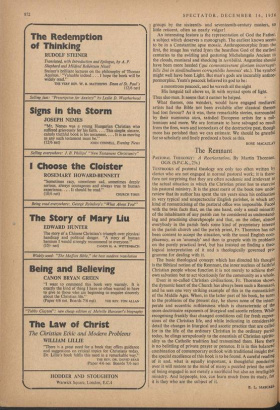The Remnant
PASTORAL THEOLOGY: A Reorientation. By Martin Thornton. OGS. (S.P.C.K., 25s.) TEXTBOOKS of pastoral theology are only too often written by clerics who are not engaged in normal pastoral work; it is there- fore not surprising that they are often academic and irrelevant to the actual situation in which the Christian priest has to exercise his pastoral ministry. It is the great merit of the book now under review that its author has spent the ten years since his ordination in very typical and unspectacular English parishes, in which any kind of romanticising of the pastoral office was impossible. Faced with the twin facts that, on the one hand, only a small minority of the inhabitants of any parish can be considered as understand' ing and practising churchpeople and that, on the other, almost everybody in the parish feels some kind of proprietary interest in the parish church and the parish priest, Fr. Thornton has not been content to accept the situation, with the usual English com- placency, as an `anomaly' and then to grapple with its probletns on the purely practical level, but has insisted on finding a theo- logical interpretation of it and a theologically governed pro' gramme for dealing with it.
The basic theological concept which has directed his thought is the Biblical notion of the Remnant, the inner nucleus of faithful Christian people whose function it is not merely to achieve their own salvation but to act vicariously for the community as a whole.
Even in so-called Christian civilisations, Fr. Thornton shows, the dynamic heart of the Church has always been such a Remnant, and he sees one very striking example of this in the monasticism of the Middle Ages. When, in the latter part of his book, he turns to the problems of the present day, he shows none of the intent' perate and eccentric ruthlessness which is characteristic of the more doctrinaire exponents of liturgical and ascetic reform. While recognising frankly that changed conditions call for fresh expres- sions of the Christian life, and while indicating in considerable detail the changes in liturgical and ascetic practice that are called for in the life of the ordinary Christian in the ordinary parish today, he clings scrupulously to the essentials of Christian spiritiv ality as the Catholic tradition had transmitted them. Here there is no belittling of private prayer or penance. It is in this balanced combination of contemporary outlook with traditional insight that the special excellence of this book is to be found. A careful reading of it and, what is equally important, a thoughtful pondering over it will restore to the mind of many a puzzled priest the sense of being engaged in not merely a sacrificial but also an intelligible ministry. And laypeople, too, can learn much from its study, for it is they who are the subject of it.
E. L. MASCAVI










































 Previous page
Previous page